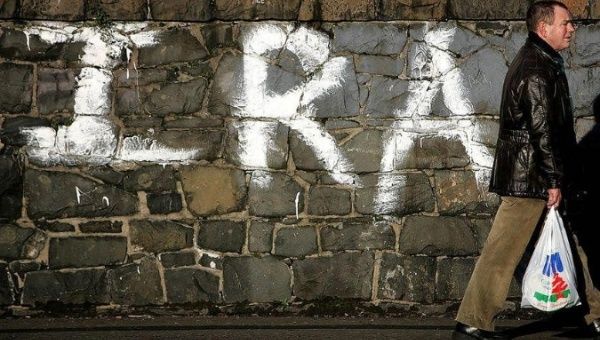
A man walks past Irish Republican graffiti in west Belfast in a file photo. Photo courtesy of Telesur
DUBLIN, April 23 (NNN-TELESUR) – The new Irish Republican Army (IRA) claimed responsibility for the killing of journalist Lyra McKee and offered “sincere apologies”, in a statement to The Irish News Tuesday.
“In the course of attacking the enemy, Lyra McKee was tragically killed while standing beside enemy forces,” the statement reads, adding that “the IRA offer our full and sincere apologies to the partner, family, and friends of Lyra McKee for her death.”
The 29-year-old Northern Irish journalist was shot dead during rioting in Derry on April 18, after a riot broke out in the Irish nationalist Creggan area of the city. The self-styled new IRA, which formed in 2012, accused police of “provoking” the rioting that preceded the gun attack that killed McKee.
The statement, which was signed T O’Neill, concluded that the group “have instructed,” its “volunteers to take the utmost care in future when engaging the enemy, and put in place measures to help ensure this.” On Saturday, the Police Service of Northern Ireland (PSNI) arrested two young men that were later released.
The death of McKee, described by her publisher Faber as a rising star of investigative journalism, was condemned by both Irish Catholic nationalist and pro-British Protestant unionist politicians.
Speaking at a Saoradh, a political party with links to dissident militants, commemoration in Belfast Monday chairman Brian Kenna repeated the call for an apology. While Belfast member Dee Fennell made a similar call during an address outside the General Post Office in Dublin on Saturday.
However, the death comes, as tensions in Northern Ireland are once again threatening the 1998 Good Friday peace deal. Politicians have warned that Britain’s plans to leave the European Union could also undermine the deal and that any return of restrictive infrastructure along the Irish-Northern Irish border would become targets for militants.
The New IRA and splinter groups have increased recently a series of violent attacks. Last month, it claimed responsibility for a series of parcel bombs sent to buildings in London and Glasgow, intended for army recruitment offices.
NNN-TELESUR



